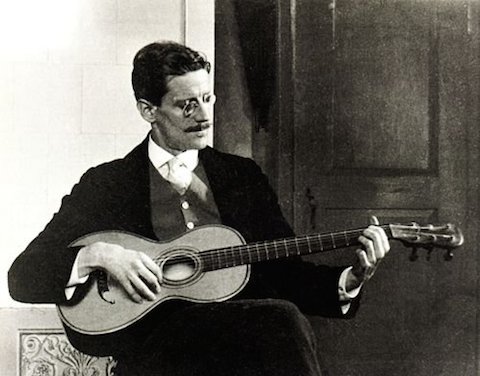
Last week we quoted a review that Carl Jung wrote of James Joyce’s Ulysses in which the psychologist called the labyrinthine modernist novel an “aesthetic discipline.” Jung’s phrase can describe equally the reader’s experience and Joyce’s own highly sophisticated artistry. The author himself produced a detailed schema of Ulysses’ structure for his friend Stuart Gilbert: in addition to primary fields of reference like human biology and color symbolism, Joyce connects each chapter to a particular “art”—theology, rhetoric, architecture, and medicine, to mention but a few. But for all this rigorous schematization of each episode, music spills out into every chapter and fully permeates the novel: advertising jingles, hymns, sonorous high oratory, sentimental ballads, brooding folk songs…. Joyce heard music everywhere.
And it’s no surprise, given that the novelist once aspired to a career as a performer. Joyce composed his own songs, played piano and guitar, sang in his high tenor, and championed the work of fellow Irishman and tenor John Sullivan. He was also, again unsurprisingly, a scholar of music. Sunphone Records, which released a two-volume set called Music From the Works of James Joyce, remarks that he had an “encyclopedic mastery of music of every type and genre, rivaling his vast knowledge of world literature. As a writer, he nevertheless incorporated music into all his works in increasingly complex ways.” (For detailed info on the music that inspired Joyce, visit the Sunphone Records site and click through the links.)
Music From the Works of James Joyce compiles many of the songs Joyce alluded to in his poems, stories, and novels (such as music-hall ballad “Finnegan’s Wake”). It also includes Joyce’s own work—his collection of poems, Chamber Music—given “musical settings” by composer Ross Lee Finney. Inspired by this enlightening collection of Joyce’s favorite music, blogger ulyssestone of Spotify Classical Playlists compiled the playlist above of all the songs available to stream. This playlist includes not only songs that influenced the author, or were written by him; ulyssestone also added several songs that Joyce inspired, such as Syd Barrett’s “Golden Hair,” based on a poem from Chamber Music, Kate Bush’s “Flower of the Mountain,” based on Molly Bloom’s final soliloquy, and Jefferson Airplane’s “Rejoyce,” a “highly selective cap of Ulysses.” John Cage’s Roaratorio appears, as does the work of several other Joyce-inspired classical composers.
The playlist begins with the voice of James Joyce, not singing alas, but reading from Ulysses’ “Eolian” episode. DJ Spooky (alias of Paul D. Miller) mixes the author’s voice with Erik Satie’s Gnossiennes. To hear the unadulterated Joyce reading, check out our post on the only two recordings of his voice.
Note: If you need to download Spotify in order to hear the playlist, you can find/download the software here.
Related Content:
James Joyce Reads From Ulysses and Finnegans Wake In His Only Two Recordings (1924/1929)
James Joyce Plays the Guitar, 1915
Carl Jung Writes a Review of Joyce’s Ulysses and Mails It To The Author (1932)
Josh Jones is a writer and musician based in Durham, NC. Follow him at @jdmagness


Joyce also inspired Black 47 to write “I Got Laid on James Joyce’s Grave.” I’m sure the old man would approve.
http://youtu.be/fA79LyAQlj8
There’s this rendition of some lyrics from Joyce’s ‘Chamber Music’ by Robin Williamson (formerly of The Incredible String Band). It’s from his solo album Myrrh (1972), and is entitled ‘Strings in the Earth and Air’. nnhttps://www.youtube.com/watch?v=xwveqn7ERwQ